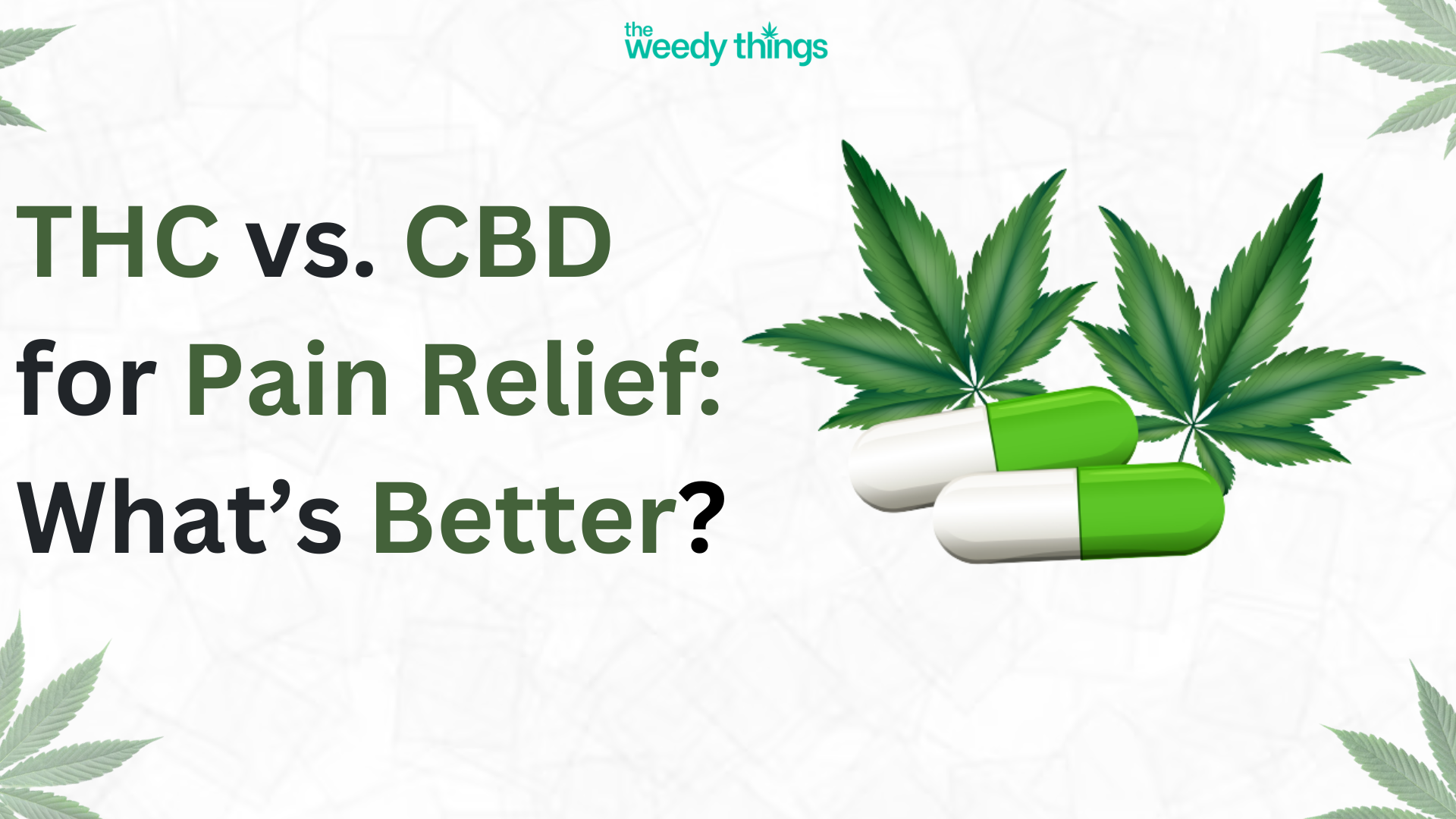Pain is a universal human experience, and finding effective ways to manage it is a never-ending quest. In recent years, the spotlight has turned to cannabis-derived compounds, particularly THC (tetrahydrocannabinol) and CBD (cannabidiol), as potential remedies for pain. Both compounds have gained recognition for their therapeutic properties, but understanding which is better for pain relief requires a closer look.
THC vs. CBD: The Basics
THC (Tetrahydrocannabinol): THC is the psychoactive compound in cannabis that produces the euphoric “high” commonly associated with the plant. It interacts with the brain’s cannabinoid receptors, impacting mood, perception, and pain perception. This psychoactive effect has led to some reservations about its use.
CBD (Cannabidiol): CBD is another compound found in cannabis, and it’s non-psychoactive. It interacts with the endocannabinoid system, which plays a role in regulating various physiological processes, including pain perception. CBD is renowned for its potential therapeutic benefits without the “high.”
Pain Relief: THC vs. CBD
The choice between THC and CBD for pain relief hinges on various factors, including the type of pain, individual preferences, and local regulations.
Neuropathic Pain
Neuropathic pain results from damage to or dysfunction of the nervous system. THC has shown promise in alleviating neuropathic pain, thanks to its interaction with cannabinoid receptors. It may provide relief for conditions like diabetic neuropathy and multiple sclerosis.
CBD has also demonstrated potential in managing neuropathic pain. Some studies suggest that CBD can help reduce pain and improve sleep in individuals with chronic pain conditions, making it a viable option for neuropathic pain sufferers.
Inflammatory Pain
Inflammatory pain arises from conditions such as arthritis, injuries, or autoimmune disorders. Both THC and CBD have anti-inflammatory properties that can help alleviate this type of pain.
THC: The anti-inflammatory effects of THC have been documented, and it can be beneficial for conditions like rheumatoid arthritis. However, the psychoactive effects of THC may not be suitable for everyone, particularly during the day.
CBD: CBD’s anti-inflammatory properties make it an attractive option for inflammatory pain. It may help reduce pain and inflammation without the mind-altering effects of THC.
Chronic Pain
Chronic pain is often long-lasting and can result from various underlying conditions. Here, the choice between THC and CBD may depend on the patient’s tolerance for psychoactive effects.
THC: THC can be effective for managing chronic pain, but its psychoactive nature may limit its use, particularly for individuals who need to remain alert and focused.
CBD: CBD is well-tolerated and can be taken daily for extended periods. It is a practical choice for those seeking long-term pain relief without the “high.”
Acute Pain
Acute pain is usually sudden and results from injuries or surgical procedures. While THC and CBD can both provide relief, the psychoactive effects of THC may be more apparent in this context.
THC: THC can offer effective pain relief for acute conditions. It’s often used for post-operative pain management, but patients need to be aware of its psychoactive effects.
CBD: CBD may also help with acute pain, especially when used in combination with THC. Its anti-inflammatory properties can complement the pain-relieving effects of THC without causing significant intoxication.
Personal Preferences and Local Regulations
Individual preferences play a significant role in choosing between THC and CBD. Some individuals prefer the psychoactive effects of THC, while others prefer the non-intoxicating properties of CBD. Additionally, local regulations regarding the use of THC and CBD may influence the decision.
CBD Oil in Chiang Mai and the Best CBD Oil in Thailand
When considering CBD oil for pain relief, here are some essential factors to keep in mind:
Product Quality
Choose a reputable brand known for producing high-quality CBD oil. Look for products that have undergone third-party testing for purity and potency.
Dosage
The optimal CBD dosage for pain relief can vary from person to person. It’s advisable to start with a low dose and gradually increase it until you achieve the desired effect. Consulting with a healthcare professional can provide valuable guidance.
Full-Spectrum vs. Isolate
Full-spectrum CBD oil contains a range of cannabinoids, including trace amounts of THC. This may enhance the overall therapeutic effect, known as the “entourage effect.” CBD isolate, on the other hand, contains only pure CBD. The choice between the two depends on your preference and sensitivity to THC.
Local Regulations
Ensure that you are aware of and compliant with local regulations regarding CBD use in your area, including Chiang Mai and Thailand as a whole.
The choice between THC and CBD for pain relief is not a one-size-fits-all decision. Each compound has its unique properties and benefits, and the best choice depends on your specific pain condition, personal preferences, and local regulations. When exploring CBD oil in Chiang Mai or seeking the best CBD oil in Thailand, ensure that you source high-quality products and, if necessary, consult with a healthcare professional for tailored guidance. Ultimately, the goal is to find the most effective and comfortable pain relief solution for your individual needs.
Frequently Asked Questions
It varies. THC may provide stronger relief, but CBD is non-psychoactive and suits some individuals better.
Yes, the combination may enhance pain relief, balancing THC’s psychoactive effects with CBD’s calming influence.
Yes, THC may cause euphoria, while CBD is non-intoxicating. Individual reactions vary; consult healthcare professionals for guidance.
Yes, THC legality varies. CBD is legal in many places but check local regulations for compliance.
Yes, individual preferences, tolerance, and desired effects guide the choice between THC and CBD for pain relief.




